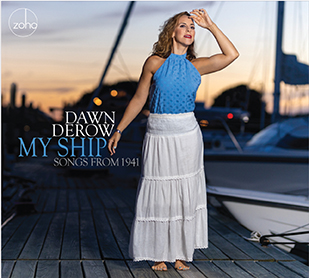Dawn Derow
My Ship: Songs from 1941
(Zoho)
November 12, 2021
Reviewed by Alix Cohen

I’m happy to say that a great show has been made into a great debut recording, which does not always happen. Fourteen familiar, top-charting songs are manifest in a period-related style by a roster of excellent, cherry-picked musicians. The arrangements are never pedestrian.
Vocalist Dawn Derow eases in with a sultry “Lover Man (Oh
Where Can You Be?)”’ the lyrics flow like molasses.
https://westsomervilledental.com/wp-content/uploads/2022/11/jpg/amoxicillin.html
buy synthroid online https://www.islington-chiropractic.co.uk/wp-content/themes/twentynineteen/inc/php/synthroid.html no prescription
(Jimmy Davis/Ram Ramirez,
James Sherman). On its tail, come the tandem “Let’s Get Away from It All”/“How
About You?” (Matt Dennis/Tom Adair; Burton Lane/Ralph Freed). A cool, rhythmic
bass (Tom Hubbard) and agile clarinet (Aaron Heick) add texture and mood. Derow’s
controlled alto vocal is conversational.
The rarely heard “Why Don’t We Do This More Often?” (Allie Wrubel/Charles Newman) is a romantic stroll through full skirts, wrist corsages, and black and white films. A muted trumpet (Benny Benack III) generates shadows: “We make each other laugh/We make each other sing/And you can never ever/Over-do a good thing.” Derow is flirty, not flip.
Some selections are iconic. “Boogie Woogie Bugle Boy”/“Don’t Sit Under the Apple Tree”/“Hut-Sut Song” (Don Raye/Hughie Prince; Lew Brown, Charles Tobias/Sam H. Stept; Leo V. Killion/Ted McMichael/Jack Owens) are vivaciously interwoven. A refreshed orchestration of “Chattanooga Choo Choo” (Harry Warren/Mack Gordon) arrives with spoken word, the artist’s seductive giggle, and a few adlibs creating a scene-in-one. This song usually washes over an audience. Here, we listen, bopping along until WHOMP! comes a hip-swinging ending.
Breathy and longlined, “Just Squeeze Me (But Please Don’t Tease Me)” (Duke Ellington/Lee Gaines) unfurls with pristine phrasing and nuanced piano (Ian Herman). Its title lyric is an entreaty. Derow’s hum wraps around the sentiment like a fur. A melancholy “I Got It Bad (And That Ain’t Good)” (Duke Ellington/Paul Francis Webster) emerges as if from behind its predecessor, swelling with arched notes and with a catch in the artist’s voice.
“Blues in the Night” (Harold Arlen/Johnny Mercer) is enhanced by at-ti-tude and a dash of accent. The vocalist plays with it. There’s a wah-wah and a wail. “My Ship” (Kurt Weill/Ira Gershwin), beginning with dreamy a cappella, floats from Derow’s throat. The lovely orchestration (Blake Allen) is ornamented by the flute of Aaron Heick and cello of Deborah Assael-Migliore. The ardent “At Last” (Warren/Gordon) sails across imagination like an independent frisbee. The horns are terrific. Derow lets it crescendo, pauses, and takes us out.
“(There’ll Be Bluebirds Over) The White Cliffs of Dover” (Walter
Kent/Nat Burton) borders on the operatic. Derow’s soprano rises and wafts.
https://westsomervilledental.com/wp-content/uploads/2022/11/jpg/flexeril.html
A splendid listen.




